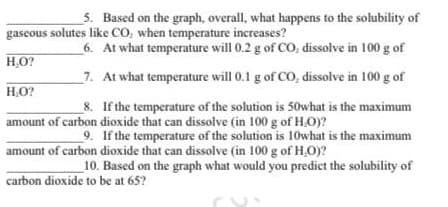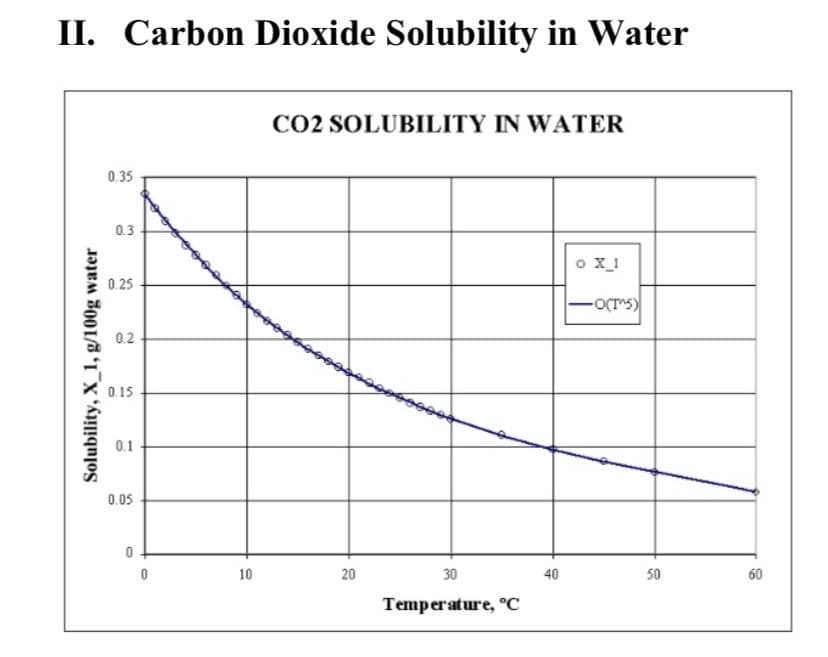5. Based on the graph, overall, what happens to the solubility of gascous solutes like CO, when temperature increases? 6. At what temperature will 0.2 g of CO, dissolve in 100 g of H,O? 7. At what temperature will 0.1 g of CO, dissolve in 100 g of H.O? 8. If the temperature of the solution is 50what is the maximum amount of carbon dioxide that can dissolve (in 100 g of H.O)? 9. If the temperature of the solution is 10what is the maximum amount of carbon dioxide that can dissolve (in 100 g of H,Oy? 10. Based on the graph what would you predict the solubility of carbon dioxide to be at 65?
5. Based on the graph, overall, what happens to the solubility of gascous solutes like CO, when temperature increases? 6. At what temperature will 0.2 g of CO, dissolve in 100 g of H,O? 7. At what temperature will 0.1 g of CO, dissolve in 100 g of H.O? 8. If the temperature of the solution is 50what is the maximum amount of carbon dioxide that can dissolve (in 100 g of H.O)? 9. If the temperature of the solution is 10what is the maximum amount of carbon dioxide that can dissolve (in 100 g of H,Oy? 10. Based on the graph what would you predict the solubility of carbon dioxide to be at 65?
Chemistry: The Molecular Science
5th Edition
ISBN:9781285199047
Author:John W. Moore, Conrad L. Stanitski
Publisher:John W. Moore, Conrad L. Stanitski
Chapter13: The Chemistry Of Solutes And Solutions
Section13.1: Solubility And Intermolecular Forces
Problem 13.1PSP
Related questions
Question

Transcribed Image Text:5. Based on the graph, overall, what happens to the solubility of
gaseous solutes like CO, when temperature increases?
6. At what temperature will 0.2 g of CO, dissolve in 100 g of
H,O?
7. At what temperature will 0.1 g of CO, dissolve in 100 g of
H.O?
8. If the temperature of the solution is 50what is the maximum
amount of carbon dioxide that can dissolve (in 100 g of H.O)?
9. If the temperature of the solution is 10what is the maximum
amount of carbon dioxide that can dissolve (in 100 g of H,O)?
10. Based on the graph what would you predict the solubility of
carbon dioxide to be at 65?

Transcribed Image Text:II. Carbon Dioxide Solubility in Water
CO2 SOLUBILITY IN WATER
0.35
0.3
o x_1
0.25
0.2
0.15
0.1
0.05
10
20
30
40
50
60
Теmperature, "С
Solubility, X 1, g/100g water
Expert Solution
This question has been solved!
Explore an expertly crafted, step-by-step solution for a thorough understanding of key concepts.
This is a popular solution!
Trending now
This is a popular solution!
Step by step
Solved in 4 steps

Knowledge Booster
Learn more about
Need a deep-dive on the concept behind this application? Look no further. Learn more about this topic, chemistry and related others by exploring similar questions and additional content below.Recommended textbooks for you

Chemistry: The Molecular Science
Chemistry
ISBN:
9781285199047
Author:
John W. Moore, Conrad L. Stanitski
Publisher:
Cengage Learning

Chemistry & Chemical Reactivity
Chemistry
ISBN:
9781133949640
Author:
John C. Kotz, Paul M. Treichel, John Townsend, David Treichel
Publisher:
Cengage Learning

Chemistry & Chemical Reactivity
Chemistry
ISBN:
9781337399074
Author:
John C. Kotz, Paul M. Treichel, John Townsend, David Treichel
Publisher:
Cengage Learning

Chemistry: The Molecular Science
Chemistry
ISBN:
9781285199047
Author:
John W. Moore, Conrad L. Stanitski
Publisher:
Cengage Learning

Chemistry & Chemical Reactivity
Chemistry
ISBN:
9781133949640
Author:
John C. Kotz, Paul M. Treichel, John Townsend, David Treichel
Publisher:
Cengage Learning

Chemistry & Chemical Reactivity
Chemistry
ISBN:
9781337399074
Author:
John C. Kotz, Paul M. Treichel, John Townsend, David Treichel
Publisher:
Cengage Learning

Chemistry: Matter and Change
Chemistry
ISBN:
9780078746376
Author:
Dinah Zike, Laurel Dingrando, Nicholas Hainen, Cheryl Wistrom
Publisher:
Glencoe/McGraw-Hill School Pub Co

General Chemistry - Standalone book (MindTap Cour…
Chemistry
ISBN:
9781305580343
Author:
Steven D. Gammon, Ebbing, Darrell Ebbing, Steven D., Darrell; Gammon, Darrell Ebbing; Steven D. Gammon, Darrell D.; Gammon, Ebbing; Steven D. Gammon; Darrell
Publisher:
Cengage Learning

Chemistry by OpenStax (2015-05-04)
Chemistry
ISBN:
9781938168390
Author:
Klaus Theopold, Richard H Langley, Paul Flowers, William R. Robinson, Mark Blaser
Publisher:
OpenStax